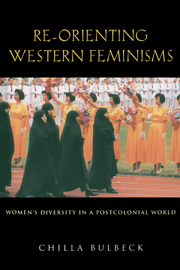Book contents
- Frontmatter
- Contents
- Acknowledgements
- Abbreviations
- Introduction
- 1 Fracturing Binarisms: First and Third Worlds
- 2 Individual versus Community
- 3 Mothers and Wives
- 4 Sexual Identities: Western Imperialism?
- 5 The International Traffic in Women
- Conclusion: Braiding at the Borderlands
- Endnotes
- Bibliography
- Index
2 - Individual versus Community
Published online by Cambridge University Press: 29 January 2010
- Frontmatter
- Contents
- Acknowledgements
- Abbreviations
- Introduction
- 1 Fracturing Binarisms: First and Third Worlds
- 2 Individual versus Community
- 3 Mothers and Wives
- 4 Sexual Identities: Western Imperialism?
- 5 The International Traffic in Women
- Conclusion: Braiding at the Borderlands
- Endnotes
- Bibliography
- Index
Summary
I'm glad you've read ‘Wild Swans’. Although I disagree with the authors in some respect, the book itself is objective. The author introduced the social changes of China through telling life stories of three generations of her family – maybe this is the most easily accepted way by foreigners. Today, to most Chinese people even including those who came into power during the Cultural Revolution, the life in [the] 1960s is like a nightmare, for you have to hide your natural selves and follow the fast-changing political trend in order to escape misfortune.
– Letter from young Chinese friend to author, December 1994Tamara Jacka (1994:666) notes that when rural Chinese women were asked questions about their status or personal welfare, they were frequently either ‘completely nonplussed by the question, or will respond in terms of their family's welfare’. But they also understood exactly what Jacka ‘was getting at’ when she asked who controlled the family income or who did the housework, the latter question provoking laughter ‘because the answer is so obvious’. The comment about Wild Swans above reveals my friend's suspicion that white westerners desire personal narratives more so than Chinese readers. But because she also notes that the Chinese have ‘natural selves’ which had to be disguised during the Cultural Revolution, she is not endorsing the simple opposition between self and community, between individualism and connectedness, between an interior life and externally constituted roles, which is often a feature of western constructions. For her, the Chinese also have ‘selves’ which had to be disguised by the communitarian impulses of the Cultural Revolution.
- Type
- Chapter
- Information
- Re-orienting Western FeminismsWomen's Diversity in a Postcolonial World, pp. 57 - 96Publisher: Cambridge University PressPrint publication year: 1997



